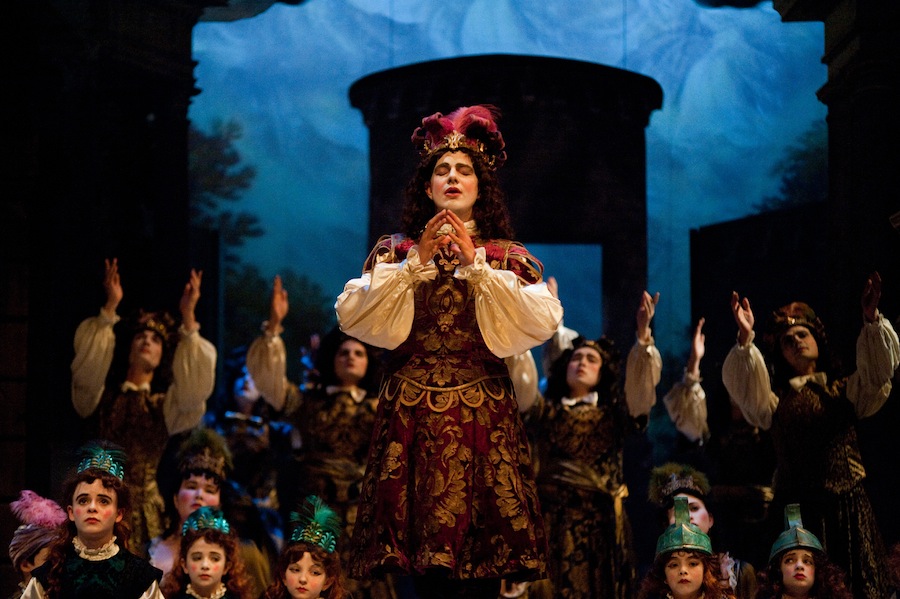“Niobe” launches Boston Early Music Festival in colorful, richly melodic style

Philippe Jaroussky stars as Anfione in Agostino Steffani's "Niobe, regina di Tebe," presented Sunday by the Boston Early Music Festival in its belated North American premiere. Photo: André Costantini
The Boston Early Music Festival opened with a spectacular answer to the question, “Who is Agostino Steffani?”
If you answered, “That guy somewhere between Lully and Handel,” you’re getting there. BEMF’s production of Steffani’s 1688 opera Niobe, regina di Tebe — announced as the work’s North American premiere — showed the Venetian-born composer-priest-diplomat (1654-1728) to be a master of both French court dances and Italian recitative-and-aria drama, and something else besides: a weaver of stage effects that evoke deep poetic and philosophical resonances.
Well, that’s what Wagner said opera was all about, isn’t it? And so the BEMF began its week of performances in many musical media on Sunday afternoon with a Gesamtkunstwerk of its own. And what better venue than the Cutler Majestic Theatre, the Baroque performing-arts palace just off Boston Common? The gilded balconies, scrollwork, and caryatids of the auditorium seemed to embrace the Theban palace scenery onstage, which was made of period-appropriate sliding flats, drops, and a versatile flying cloud-machine that carried cast members heavenward or earthward, as necessary.
But one quickly forgot the mechanical aspects of the production, except to enjoy how imaginatively they were used. Likewise for the “Thebans” in Louis XIV garb and shoulder-length locks, standing in stylized courtly poses and wearing yards of brocade. (And that was just the men.) That’s because, no matter what Wagner said, opera is music. And Steffani’s music is rich, varied, subtle, and sometimes astonishing.
Steffani and his librettist Luigi Orlandi really should have called this opera Anfione. The legend of Amphion, Niobe’s husband and King of Thebes — an Orpheus-like figure whose music was so powerful that it attracted stones to gather and form a protective wall around the city — inspired most of the opera’s best moments. Countertenor Philippe Jaroussky, as Anfione, often held the audience spellbound with his creamy and silvery voice, nowhere more so than in the “Palace of Harmony” scene, where the king, withdrawing from his worldly cares, has a vision of the planets in their spheres, accompanied (uniquely in this composer’s operas) by an offstage consort of viols. In an opera with many brief arias, this is by far the longest one, and clearly intended to be a showstopper in every sense: a pause in the action, and a star moment for the singer. At the end, the Boston audience, which had listened quietly for most of the performance, burst into prolonged applause.
By contrast, Steffani did not do so well by his title character. Niobe, a kind of Real Housewife of Thebes, is excessively proud of her children, rude to her subjects, mean to nice old prophets like Tiresia (Tiresias), and vain to the point of thinking herself better than the gods. She deserves to be punished, and that’s what she gets in the last act, when the gods send lightning bolts to strike all her children dead and turn her to stone. That’s not much to work with, as a character in an opera. Steffani did write some furious and amorous music for her, and a singer who projected well vocally and dramatically might be able to do something with the part. Unfortunately, the Niobe in this production, Amanda Forsythe, is not that singer, although the soprano did sing with fluency in the bravura passages.
Even with a hole at its center — more the composer’s fault than the singer’s — this Niobe production offers many other pleasures, including vivid performances in secondary roles, from Yulia Van Doren as the radiant ingenue Manto and Charles Robert Stephens as her raging-prophet father Tiresia, to José Lemos as the comic nurse Nerea.
Composer Steffani, a noted singer from childhood, seemed to write instinctively well for the voice, and apparently had an endless supply of attractive melodies for his frequent, brief arias. The period-style dancing adds a different dimension to the drama; for example, Act II closes with Nerea’s satirical aria about men as fickle lovers, followed by a ballet to a Lully-style suite, depicting the flirtations and relationships of men and women. I don’t know if that’s what they would have danced at the premiere in Munich in 1688, but it was completely charming.
Niobe will be repeated 7 p.m. Tuesday, 7 p.m. Wednesday, 7 p.m. Friday, and 3:30 p.m. Sunday. Additional performances at Mahaiwe Performing Arts Center, 14 Castle Street, Great Barrington, Massachusetts, 7 p.m. Friday June 24, and 7 p.m. Saturday June 25. bemf.org; 617-661-1812.
While serving as the program annotator of the New York Philharmonic during the mid-1990s, David Wright received the ASCAP Deems Taylor Award for excellence in writing about music. His articles, interviews, reviews, program notes, and liner notes have appeared throughout the U.S. and abroad, including in the programs of all of the “Big Five” orchestras, Lincoln Center, Carnegie Hall, and New York’s 92nd Street Y; the New York Times, the Financial Times, and Opera News; and reference works such as the “New Grove” Second Edition, the Metropolitan Opera Encyclopedia, and the Academic American Encyclopedia.
[This article appeared originally on The Classical Review, June 13, 2011]
Posted in Performances
